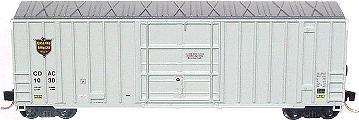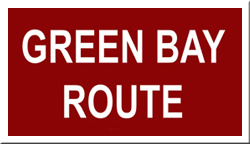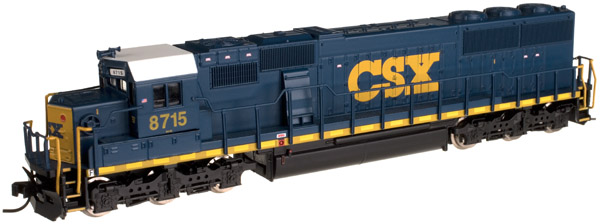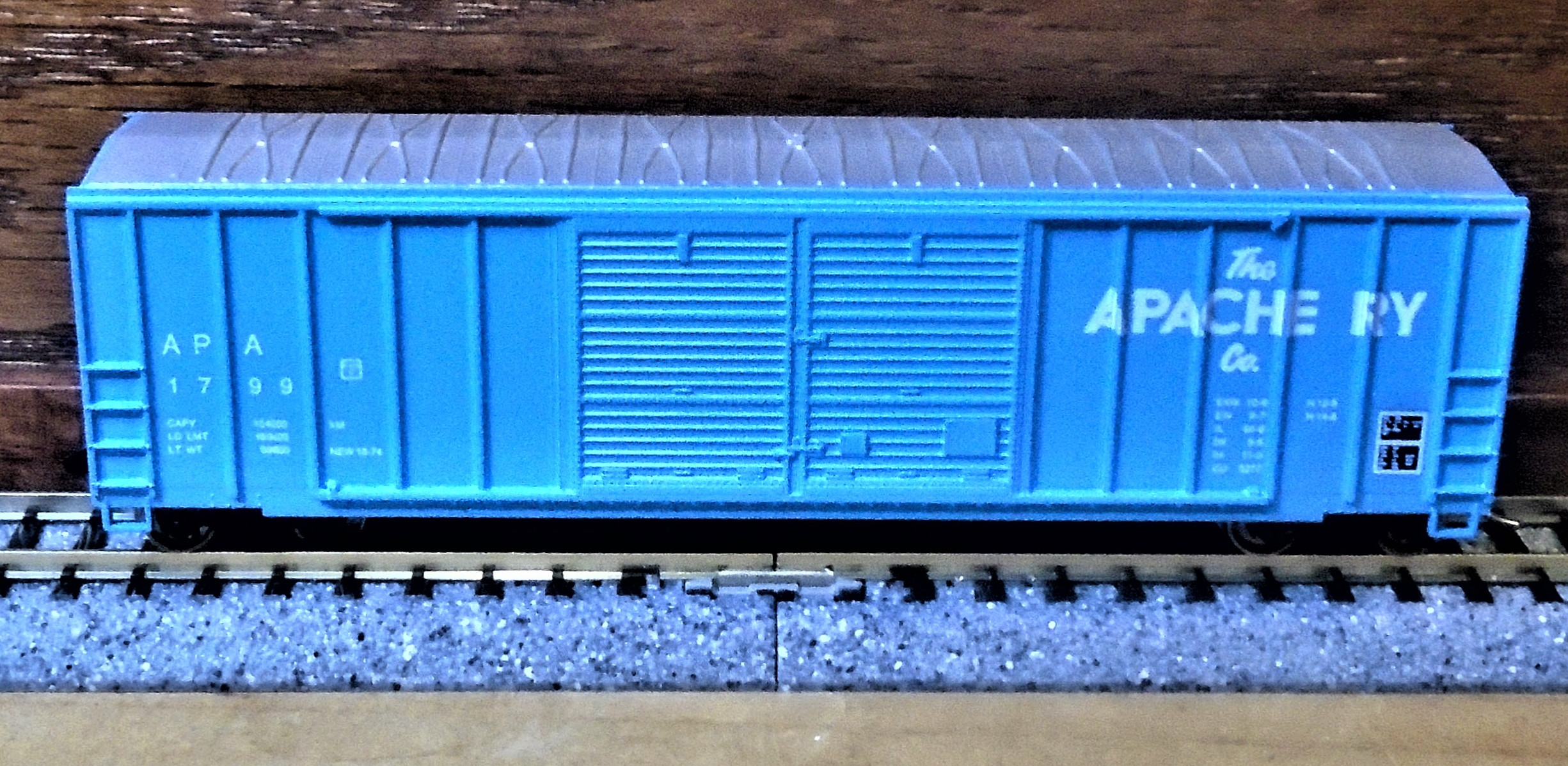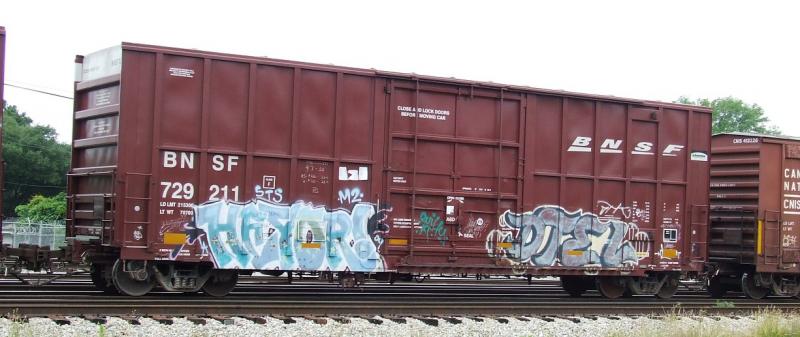LBF Company - 5510 - Boxcar, 50 Foot, Steel, Hi-Cube - Canadian American - 12 Different Available
| Stock Number | 5510 |
| Original Retail Price | $17.95 |
| Brand | LBF Company |
| Manufacturer | LBF Company |
| Body Style | E&C Boxcar Gunderson Hi-Cube |
| Prototype Vehicle | Boxcar, 50 Foot, Steel, Hi-Cube (Details) |
| Road or Company Name | Canadian American (Details) |
| Reporting Marks | CDAC |
| Road or Reporting Number | 12 Different Available |
| Paint Color(s) | White with Aluminum Roof |
| Print Color(s) | Black |
| Coupler Type | MT Magne-Matic Knuckle |
| Wheel Type | Injection Molded Plastic |
| Wheel Profile | Small Flange (Low Profile) |
| Item Category | Rolling Stock (Freight) |
| Model Type | Boxcar |
| Model Subtype | 50 Foot |
| Model Variety | Gunderson Hi-Cube |
| Prototype Region | North America |
| Prototype Era | NA Era IV: 2nd Gen Diesel (1958 - 1978) |
| Scale | 1/160 |
Specific Item Information:
LBF has done a superb job on their latest N Scale body style. Cars come factory equipped with Micro-Trains® trucks/couplers. Cars are ready-to-run, fully assembled. Each road name is available in 12 unique road #s.
Model Information:
This model was first created by E&C shops. The tooling was sold to the LBF Company and in turn when they went out of business in 2009, the model was passed on to Hubert's Model RR Mfg Group. They are available in both single and double door varieties.
Prototype History:
While the 40-foot boxcar was a standard design, and it did come in different setups depending on the type of freight being transported, it was not large enough for efficient mass commodity transportation. The 50-foot boxcar made its first appearance in the 1930s and steadily grew in popularity over the years, which further improved redundancies by allowing for even more space within a given car. Today, the 50-footer remains the common boxcar size. After the second world war ended, and steel became once again readily available, steel became the go-to choice for construction of boxcars. Pullman Standard and ACF were some of the most prolific builders of these cars.
In the 1960s, the flush, "plug" style sliding door was introduced as an option that provides a larger door to ease loading and unloading of certain commodities. The tight-fitting doors are better insulated and allow a car's interior to be maintained at a more even temperature.
The 50 foot hi-cube boxcar fleet is similar to a 50 foot standard car with an additional 2 feet of interior height. This is known as a "Plate F" boxcar. 50 foot Hi-Cube boxcars typically have a load capacity of 100 tons and are equipped with cushion underframes and plug doors. These cars are used primarily in rolled paper service as the extra height is needed to accommodate the larger rolls that are now commonplace. They can also be used for similar commodities handled in other 50’ or 60’ boxcars.
In the 1960s, the flush, "plug" style sliding door was introduced as an option that provides a larger door to ease loading and unloading of certain commodities. The tight-fitting doors are better insulated and allow a car's interior to be maintained at a more even temperature.
The 50 foot hi-cube boxcar fleet is similar to a 50 foot standard car with an additional 2 feet of interior height. This is known as a "Plate F" boxcar. 50 foot Hi-Cube boxcars typically have a load capacity of 100 tons and are equipped with cushion underframes and plug doors. These cars are used primarily in rolled paper service as the extra height is needed to accommodate the larger rolls that are now commonplace. They can also be used for similar commodities handled in other 50’ or 60’ boxcars.
Road Name History:
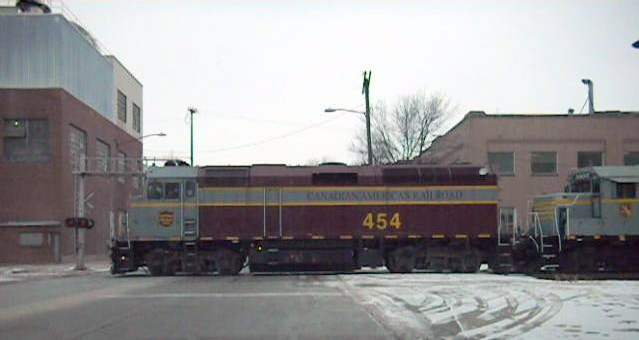 CDAC was born from the 1995 breakup of CP Rails “Canadian Atlantic Railway” business unit. Iron Road Railways (who owned Bangor & Aroostook) bought the line from Brownville Junction, Maine (on the BAR) to Montreal, Quebec. The western end of the line from Lennoxville, Quebec to Montreal became the Quebec Southern while the rest became the Canadian American Railroad.
CDAC was born from the 1995 breakup of CP Rails “Canadian Atlantic Railway” business unit. Iron Road Railways (who owned Bangor & Aroostook) bought the line from Brownville Junction, Maine (on the BAR) to Montreal, Quebec. The western end of the line from Lennoxville, Quebec to Montreal became the Quebec Southern while the rest became the Canadian American Railroad.
CDAC adopted a paint scheme reminiscent of Canadian Pacific’s pre-1967 scheme. In addition to a small fleet of EMD/GMD GP units, CDAC acquired a handful of ex-Amtrak F40PHs which they used for freight service. Alas, parent company Iron Road Railways ran into trouble and declared bankruptcy in 2002. During the reorganization, according to some reports, CDAC was merged into Bangor & Aroostook. In 2003, All Iron Road Railways lines were purchased by Ed Burkhardt’s Rail World and merged to become the ill-fated Montreal Maine & Atlantic Railroad.

CDAC adopted a paint scheme reminiscent of Canadian Pacific’s pre-1967 scheme. In addition to a small fleet of EMD/GMD GP units, CDAC acquired a handful of ex-Amtrak F40PHs which they used for freight service. Alas, parent company Iron Road Railways ran into trouble and declared bankruptcy in 2002. During the reorganization, according to some reports, CDAC was merged into Bangor & Aroostook. In 2003, All Iron Road Railways lines were purchased by Ed Burkhardt’s Rail World and merged to become the ill-fated Montreal Maine & Atlantic Railroad.
Brand/Importer Information:
 The LBF company was based in Roseburg Oregon founded by Fred Becker. LBF was the successor company to E&C Shops, also founded by Becker. LBF also did business under the name USA Plastics. USA Plastics/LBF opened for business in 1993. They produced N Scale models using toolings purchased from the E&C Company. Later, in 1998, LBF folded and the toolings were sold to Hubert's Model RR Manufacturing group which was also located in Roseburg. Hubert had been one of Becker's partners in LBF/USA Plastics. Later, when Hubert's operation folded, the toolings were acquired by InterMountain.
The LBF company was based in Roseburg Oregon founded by Fred Becker. LBF was the successor company to E&C Shops, also founded by Becker. LBF also did business under the name USA Plastics. USA Plastics/LBF opened for business in 1993. They produced N Scale models using toolings purchased from the E&C Company. Later, in 1998, LBF folded and the toolings were sold to Hubert's Model RR Manufacturing group which was also located in Roseburg. Hubert had been one of Becker's partners in LBF/USA Plastics. Later, when Hubert's operation folded, the toolings were acquired by InterMountain.

Item created by: CNW400
on 2020-07-07 09:25:34
Last edited by: CNW400 on 2020-07-07 09:25:35
If you see errors or missing data in this entry, please feel free to log in and edit it. Anyone with a Gmail account can log in instantly.
Last edited by: CNW400 on 2020-07-07 09:25:35
If you see errors or missing data in this entry, please feel free to log in and edit it. Anyone with a Gmail account can log in instantly.


